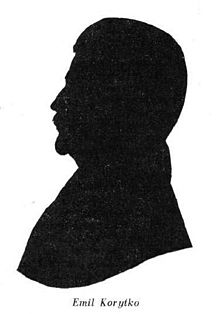Emil Antoni Korytko (7 September 1813 – 31 January 1839) was a Polish political activist in the period of the Great Emigration, who was exiled to Ljubljana, Carniola (now Slovenia) and became an important ethnographer, philologist and translator there.[1] His legacy are collections of Slovene folk songs and vivid descriptions of Carniolan folk customs. He significantly contributed to the mutual dialogue between Polish and Slovene authors and readers.

Early life and study
editKorytko was born on 7 September 1813[2]: 8 in Zhezhava (now Zelenyi Hai, Zalishchyky Raion[3]) or Lviv in Austrian Galicia (now in the Ternopil Oblast in Ukraine). From 1832, he studied philosophy and philology at the University of Lwow. He participated in the November Uprising. In 1834, he was arrested by the Austrian authorities in Lviv on accusations of having participated in underground subversive activities, and in 1836 sent into confinement to Ljubljana, Duchy of Carniola (now in Slovenia), together with Bogusław Horodyński, where they arrived in late January 1837.[2]
Exile into Ljubljana
editIn Ljubljana, Korytko became a close collaborator of the Slovene national Romantic circle. He became a personal friend of the Slovene poet France Prešeren,[4] and helped him translate several poems by Adam Mickiewicz into German. He also translated some of Prešeren's poems into German.[5] He studied Slovene folk songs from Carniola, which he published in five volumes, and Carniolan folk customs. He prompted the painter Franz Kurz zum Turn und Goldenstein to paint 70 portraits of people in various folk costumes.[6]
Korytko died at the age of 25 in Ljubljana due to typhus, and was buried at Navje (then St. Christopher's Cemetery) in the Bežigrad District.[7] His funeral was one of the first public manifestations of Slovene patriotism. Among the young Slovene patriots chosen to carry Korytko's coffin was Karel Dežman.[8]
Commemoration
editIn November 2013, the celebration of 200th anniversary of Korytko's birth was held in Ljubljana, organised by the Polish Embassy and the University of Ljubljana. An exhibition has been held in the National and University Library of Slovenia since 7 November, and a commemorative postage stamp was issued.[9] In 2019 an exhibition devoted to Korytko was held in the Slovenian Parliament, and a special Slovenian–Polish volume was published.[10] In 2023, the Post of Slovenia issued a stamp commemorating the 210th anniversary of Korytko's birth.[11][12]
References
edit- ^ "V vzhodni Galiciji na Poljskem se je rodil etnograf Emil Korytko | Zgodovinsko društvo dr. Franca Kovačiča v Mariboru". Zgodovinsko-drustvo-kovacic.si. Retrieved 12 November 2013.
- ^ a b Leeming, Henry (1982). "Zapostavljan poljski slavist: Emil Korytko (1813–1839)" [The Neglected Polish Slavicist: Emil Korytko (1813–1839)]. Slavistična revija: časopis za jezikoslovje in literarne vede (in Slovenian). Vol. 30, no. 1. Slavistično društvo Slovenije [Slavic Society of Slovenia]. pp. 1–26.
- ^ (in Ukrainian) І. Дубецький, В. Олійник, Коритко Еміль Станіславович // Ternopil Encyclopedic Dictionary: in 4 v. / editorial board: H. Yavorskyi and other, Ternopil: "Zbruch", 2005, V. 2: К—О, S. 176. — ISBN 966-528-199-2.
- ^ "France Prešeren : Časovni trak". Preseren.net. Archived from the original on 11 November 2013. Retrieved 12 November 2013.
- ^ "Skozi cas". Rtvslo.si. Archived from the original on 11 November 2013. Retrieved 12 November 2013.
- ^ Grafenauer, Ivan (1925–1991). "Korytko Emil". Slovenski biografski leksikon (in Slovenian). Ljubljana: Slovenian Academy of Sciences and Arts. Archived from the original on 31 March 2012. Retrieved 11 November 2013.
- ^ "Tednik Demokracija | novice, blogi, komentarji, članki". Demokracija.si. Retrieved 12 November 2013.
- ^ "Karel Dežman". Slovenska biografija. ZRC SAZU. Retrieved 13 March 2023.
- ^ Kolšek, Petra (11 November 2013). "Emil Korytko, poljski pregnanec v Ljubljani" [Emil Korytko, the Polish Exile in Ljubljana]. Delo.si (in Slovenian).
- ^ Bogumila Plachtej Pavlin, Marzena Ewa Krajewska, V iskanju zgodbe Poljaka v izgnanstvu: Emil Korytko (1813–1839) v Ljubljani / W poszukiwaniu losu Polaka na wygnaniu: Emil Korytko (1813–1839) w Lublanie, Ljubljana: Narodna in univerzitetna knjižnica, 2019, ISBN 879-961-64-53-63-9.
- ^ "Coming in March 2023" (PDF). Bilten (144): 35. January 2023. Retrieved 13 March 2023.
- ^ "Emil Korytko". Pošta Slovenije. Retrieved 13 March 2023.